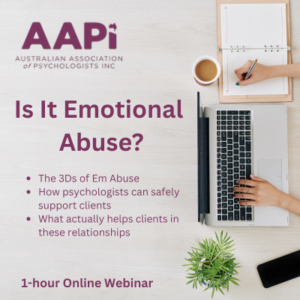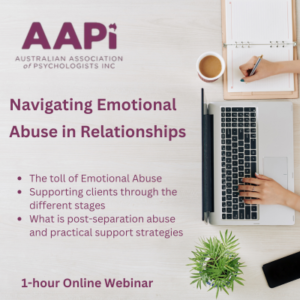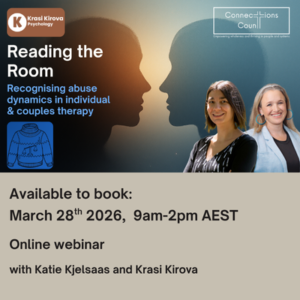
These resources will hopefully assist psychologists and therapists to better understand the dynamics of coercive control and support clients who are subjected to this kind of abuse.
You can access additional resources for personal use here.


Guidelines for Psychologists Working with Clients Experiencing IPV – Developed by The Australian Psychological Society’s Women and Psychology Interest Group.
Coercive Control Explained– A comprehensive article by UK researcher and specialist on the topic Emma Katz.
Anne Summer’s Research “The Cost and Consequences of DV” – Investigating the cost and consequences of domestic and family violence in Australia. The report influenced the federal government to make changes in its 2023 federal budget.
The prevalence of intimate partner violence in Australia: A National survey – The Medical Journal of Australia, 2025.
Timelines of psychological, physical and sexual intimate partner violence among a nationally representative sample of Australian women – Women’s Health Journal, 2025.
Ten To Men Australian Study – The use of intimate partner violence among Australian men, Aus Institute of Family Studies, 2025.
The National Principles to Address Coercive Control in Family and Domestic Violence – Released by The Attorneys-General Department in 2023 to set out a shared understanding of the common features and impacts of coercive control.
What Is Coercive Control – A comprehensive overview by Laura Richards, world-leading expert on DV, UK criminologist and the creator of the DASH Checklist.
The Invisible Chains Blog in Psychology Today – Regular column by Lisa Fontes, author of “Invisible Chains”.
Articles on Domestic Violence by Domestic Shelters – A huge range of publications by one of the biggest online directories in the US dedicated to DV.
ANROWS Research and Resources – This is Australia’s National Research Organisation for Women’s Safety, an independent, not-for-profit research organisation established to produce evidence for the reduction of violence against women and children.
Psychological Violence in Relationships (PAR) Scale – The PAR is a contemporary, concise and comprehensive 20-item measure of psychological abuse. It was validated among a sample of 765 adult women in Australia.
Risk Assessment Checklist – Based on the key evidence-based risk factors from the MARAM Framework, useful for therapists assessing family violence.
DASH Risk Checklist – The Domestic Abuse, Stalking and Honour Based Violence Risk Identification. Used nationally by UK police and government organisations.
The Power and Control Wheel – A chart that demonstrates the various tactics an abusive partner uses to maintain power and control in a relationship.
DV-Alert’s 1-day workshop training or 2-hour online webinar are both free – gain an understanding of the complexities of DV and learn how to recognise the signs, respond safely and how to refer when necessary.
Safer Families’ Toolkit for Professionals – The Safer Families Centre is part of the Sexual and Family Violence program within The University of Melbourne.
APS Webinar Training – Intimate Partner Violence: Working therapeutically with victims and perpetrators
MARAM Comprehensive Risk Assessment Training – Safe and Equal (Victoria) delivers various training modules for practitioners.
Free Webinars by DomesticShelters.org – The largest directory of domestic violence programs in the U.S. and Canada, and a leading source of helpful tools and information for people experiencing and working to end domestic violence.
Working with the Fallout of Narcissistic Abuse – Online Training by PESI with Ramani Durvasula
Webinars by ANROWS – Australia’s National Research Organisation for Women’s Safety, not-for-profit research organisation producing evidence to support the reduction of violence against women and children.
Uncovering Coercive Control and The Perpetrator Pattern Mapping Tool – developed by the Safe & Together Institute, these web-based tools empower professionals to better expose the nuanced aspects of coercive control.
Safe & Together Institute’s Online Courses – A wide range of free and paid options.


